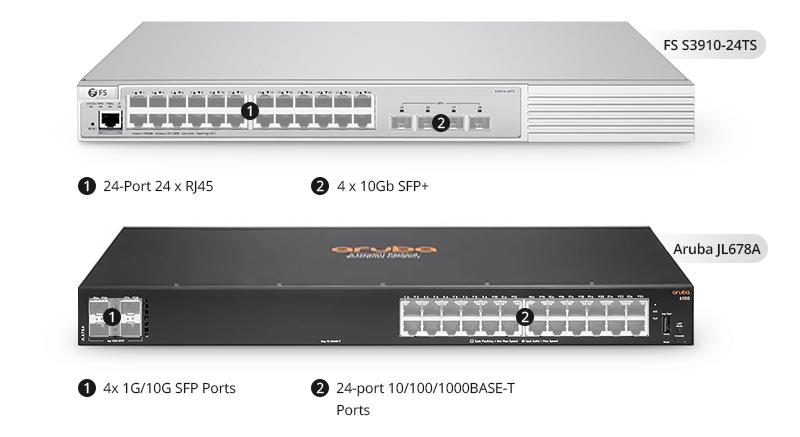In today’s interconnected world, reliable network infrastructure is crucial for businesses to thrive. Networking switches are key components, facilitating seamless data transmission and providing security and management features. This article compares the FS S2805S-8TF and Aruba J9783A switches, exploring their features, performance, scalability, management capabilities, and cost considerations. Gain insights to determine the best switch for your networking needs.
FS S2805S-8TF vs. Aruba J9783A
The FS S2805S-8TF and the Aruba J9783A are both renowned networking switches in the market, each with its own set of features and strengths. The FS S2805S-8TF is a compact, high-performance switch designed for small to medium-sized businesses, remote offices, and enterprise edge networks. On the other hand, the Aruba J9783A is a feature-rich switch for mid-sized enterprises. Here is the feature showdown of these two switches for your reference.
Performance and Features:
The FS S2805S-8TF is equipped with 8x 10/100/1000BASE-T RJ-45 ports and 2x 1Gb SFP ports. In contrast, the Aruba J9783A features 8x RJ-45 autosensing 10/100 ports, as well as dual-personality ports that can function as 10/100/1000BASE-T or SFP ports. In terms of switching capacity, the FS S2805S-8TF offers 20 Gbps, while the Aruba J9783A has a switching capacity of 5.6 Gbps. As for the forwarding rate, the FS S2805S-8TF boasts 14.88 Mpps, whereas the Aruba J9783A achieves 13.5 Mpps.
Scalability:
When it comes to scalability, both switches offer valuable options. The FS S2805S-8TF supports stacking and link aggregation, providing a flexible and efficient way to expand your network. On the other hand, the Aruba J9783A offers stacking capabilities as well as Virtual Switching Framework (VSF) technology, which allows you to create resilient and scalable networks.
Configuration Management
Efficient configuration management options are essential for optimizing network performance. The FS S2805S-8TF provides a user-friendly web-based management interface, enabling easy configuration and monitoring of network settings. It also offers command line interface (CLI) options for advanced users. In comparison, the Aruba J9783A offers Intelligent Management Center(IMC), command-line interface, Web browser, and configuration menu to provide centralized control and network visibility.
Security Features
Ensuring the security of your network is paramount, and both switches address this concern effectively. The FS S2805S-8TF supports SSH, ACLs, RADIUS, TACACS, and CPU protection features, safeguarding your data and resources. Similarly, the Aruba J9783A offers SSH, ACLs, and TACACS+ support, bolstering network security and access control.
Support & Warranty
Reliable support and warranty are concerns since everyone hopes to receive timely responses and support when their products encounter issues. FS S2805S-8TF enjoys 2 years limited warranty against defects in materials or workmanship. What’s more, it provides a personal account manager, free professional technical support, and 24/7 live customer service for each customer. If you have problems when installing or using your product, you can ask for instant assistance from FS specialists. As for Aruba J9783A, Aruba offers reliable technical support and offers a 3-year limited lifetime product warranty.
Cost Considerations
Considering cost is crucial for many organizations when selecting a switch. The FS S2805S-8TF provides a cost-effective solution, making it a desirable option for small and medium-sized enterprises. On the other hand, the Aruba J9783A might have a higher price point due to its extensive capabilities. Users should assess the budget and requirements of their specific networking needs when determining the best fit for their organization.
FS S2805S-8TF vs Aruba J9783A at a Glance
Here is a table comparing the specifications of FS S2805S-8TF and Aruba J9783A:
| Specification | FS S2805S-8TF | Aruba J9783A |
| Ports | 8x 10/100/1000BASE-T RJ-45, 2 x 1Gb SFP | 8 × RJ-45 autosensing 10/100 ports , Dual-personality ports (10/100/1000BASE-T or SFP) |
| Switching Capacity | 20 Gbps | 5.6 Gbps |
| Forwarding Rate | 14.88 Mpps | 13.5 Mpps |
| Fan | Fanless | Fanless |
| AC/DC Power Supply | AC | AC/DC |
| Cost | Varies (around US$100) | Varies (around US$300) |
Please note that the cost of these switches can vary depending on the retailer, region, and additional features or support options selected. It’s best to check with authorized vendors or the respective manufacturers for the most accurate and up-to-date pricing information.
Conclusion
In conclusion, the FS S2805S-8TF and Aruba J9783A are formidable network switches, each with its own set of advantages. The FS S2805S-8TF stands out with its superior switching capacity and forwarding rate, making it ideal for high-performance networking scenarios. Conversely, the Aruba J9783A offers unique features like VSF technology and management, which may cater to specific enterprise requirements. When deciding between the two, it is crucial to assess your network needs, scalability, reliability, management preferences, security concerns, and budget to make the most suitable choice for your organization.

